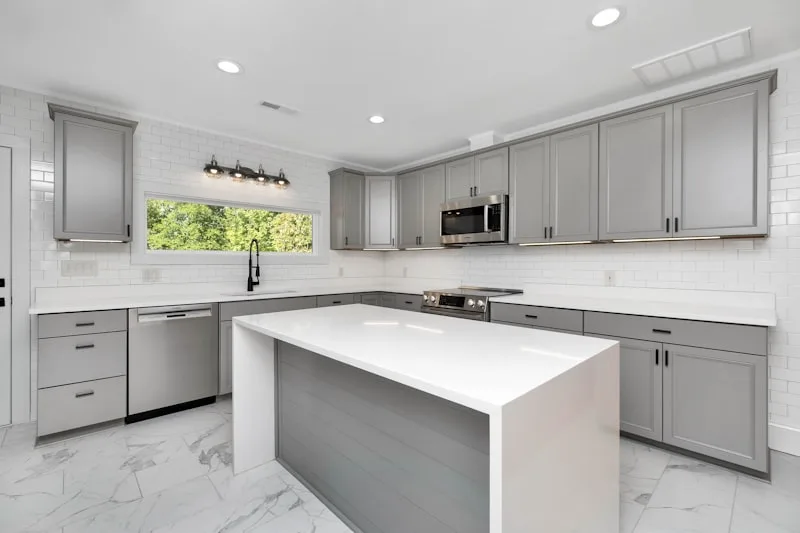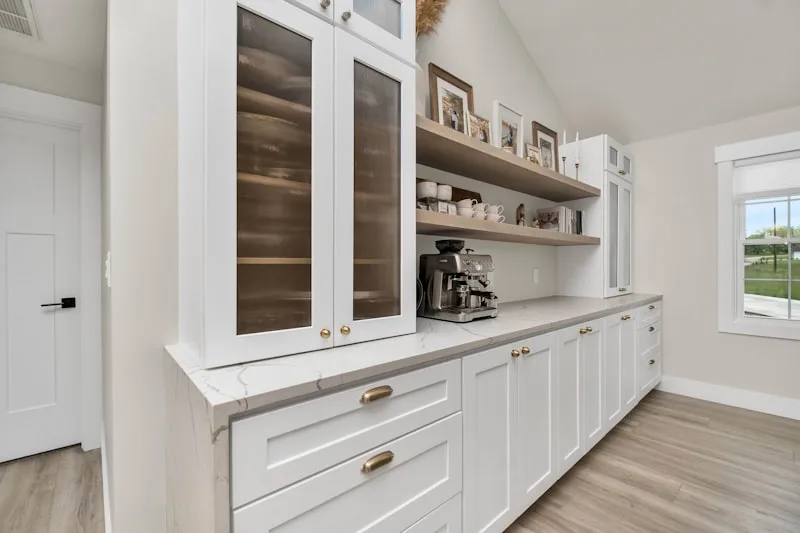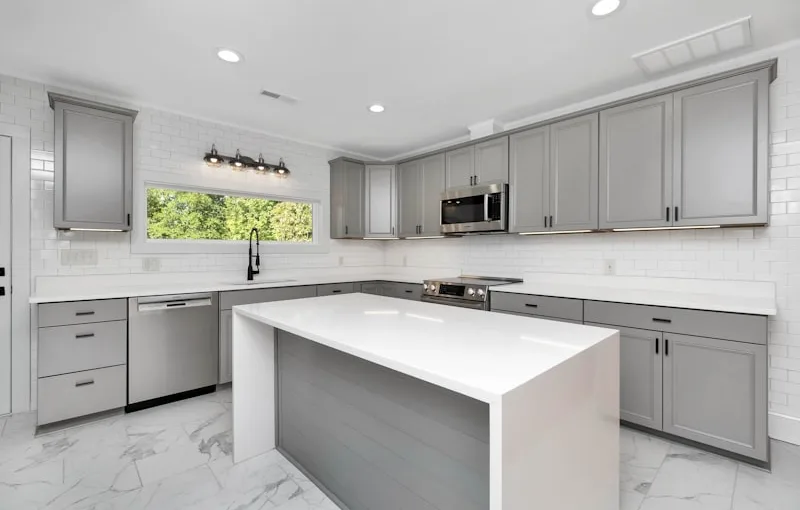First off, it’s essential to understand that countertops and cabinets are like peanut butter and jelly—they go hand in hand. When you replace your countertop, the process usually involves removing the old one, which can sometimes lead to a bit of wear and tear on your cabinets. But don’t panic! If done correctly, you can avoid any significant damage.
Imagine your cabinets as the sturdy foundation of a house. When you’re replacing the countertop, you’re essentially giving that house a facelift. If the installation team is experienced, they’ll take great care to protect your cabinets during the process. They might use padding or even temporary supports to ensure everything stays intact.
However, if you’re going the DIY route, it’s crucial to be cautious. One wrong move with a crowbar, and you could chip or scratch your cabinets. Think of it like trying to change a tire without knowing how—things can get messy fast!

Another thing to consider is the type of countertop material you choose. Heavier materials like granite or quartz may require additional support, which could put extra strain on your cabinets. So, if you’re dreaming of that stunning marble finish, make sure your cabinets are up for the challenge.
In the end, replacing your kitchen countertop doesn’t have to be a recipe for disaster. With the right approach and a little care, you can enjoy a beautiful new surface without sacrificing the integrity of your beloved cabinets.
Countertop Conundrum: Will Your Cabinets Survive a Makeover?
Imagine your kitchen as a stage, with the countertops as the star performers. They’re sleek, shiny, and oh-so-inviting. But what about the supporting cast—your cabinets? If they’re looking a bit tired or outdated, you might be tempted to give them a fresh coat of paint or a complete overhaul. But here’s the kicker: not all cabinets are created equal. Some can handle the spotlight, while others might crumble under the pressure.
Think of your cabinets like a pair of old jeans. Sure, they might fit well and have some sentimental value, but if they’re fraying at the seams, it might be time to let them go. When you’re choosing new countertops, consider the weight and material. Heavy stone countertops can be a bit of a workout for flimsy cabinets. If your cabinets are sturdy and well-constructed, they might just be able to handle the upgrade without breaking a sweat.
Renovation Risks: Can New Countertops Spell Trouble for Your Cabinets?
First off, let’s talk weight. New countertops can be significantly heavier than the ones you’re replacing. If your cabinets are older or made from lighter materials, they might not be able to handle the load. Imagine stacking a pile of bricks on a flimsy table; eventually, something’s got to give. You don’t want to find out the hard way that your cabinets can’t support your dream countertop.
Then there’s the issue of style clash. You might adore that sleek, modern granite, but if your cabinets are rustic wood, it’s like mixing oil and water. The aesthetic mismatch can make your kitchen feel disjointed, and that’s not the vibe you want when you’re whipping up a meal or entertaining guests.
And let’s not forget about installation. If your new countertops require extensive modifications to your cabinets, you could be looking at extra costs and time delays. It’s like planning a road trip only to find out your car needs a major tune-up first.
So, before you get too carried away with those gorgeous countertop options, take a step back. Assess your cabinets, consider their strength and style, and ensure they’re ready to play nice with your new addition. After all, a harmonious kitchen is a happy kitchen!
The Great Debate: Replacing Kitchen Countertops Without Damaging Cabinets
First off, let’s talk about the materials. If you’re eyeing a sleek quartz or a rustic butcher block, you’ll want to choose options that are lightweight and easy to handle. Heavy materials can put unnecessary stress on your cabinets, leading to potential damage. Think of it like carrying a stack of books; if you overload it, something’s bound to give.
Next, consider the installation process. You might be tempted to dive in headfirst, but trust me, a little planning goes a long way. Start by removing the old countertops carefully. Use a pry bar to gently lift them off, ensuring you’re not yanking on the cabinets. It’s like peeling a banana—if you’re too rough, you’ll end up with a mushy mess.
Now, when it’s time to install the new countertops, make sure they’re properly supported. You can use shims to level them out, which helps distribute weight evenly. Imagine balancing a seesaw; if one side is heavier, it’s going to tip over.
Lastly, don’t forget about the seams. A clean, professional finish not only looks great but also prevents moisture from seeping into your cabinets. It’s like sealing a sandwich; you want to keep everything fresh and intact.
So, if you’re ready to give your kitchen a facelift, remember: it’s all about the right materials, careful installation, and those finishing touches. Your cabinets will thank you!
Countertop Replacement 101: Protecting Your Cabinets During the Upgrade
First off, let’s talk about the heavy lifting. When the old countertop is being removed, it’s like a game of Jenga. One wrong move, and you could end up with scratches or dents on your cabinets. So, what can you do? Start by clearing everything off your countertops. This not only makes the job easier but also protects your cabinets from any accidental spills or debris. Think of it as giving your cabinets a little spa day before the big transformation!
Next, consider using protective coverings. A simple layer of cardboard or a drop cloth can work wonders. It’s like wrapping your cabinets in a cozy blanket, shielding them from dust and potential damage. And don’t forget about the edges! Those corners can be particularly vulnerable, so adding some extra padding can save you from a headache later on.

Lastly, communication is key. If you’re hiring professionals, make sure they know how important your cabinets are to you. A quick chat about your concerns can go a long way. It’s like having a buddy system; you look out for each other, ensuring that both your new countertops and beloved cabinets come out unscathed. So, as you embark on this exciting journey of countertop replacement, keep your cabinets in mind. They deserve just as much love and care during the upgrade!
Before You Renovate: Understanding the Impact of New Countertops on Cabinets
First off, let’s talk aesthetics. New countertops can completely transform the vibe of your kitchen. Imagine swapping out those old, worn-out surfaces for sleek granite or vibrant quartz. Suddenly, your cabinets, whether they’re a classic white or a bold navy, take on a whole new personality. But here’s the kicker: if your cabinets are outdated or mismatched, those stunning countertops might not shine as brightly as you’d hoped. It’s all about harmony, folks!
Now, let’s not forget about functionality. New countertops can change how you use your kitchen. If you’re opting for a heavier material, like marble, you’ll want to ensure your cabinets can handle the weight. Think of it like putting a heavy book on a flimsy shelf—it’s just not going to end well! You might need to reinforce your cabinets or even consider a complete upgrade to support your new countertop choice.
And what about the color? Choosing a countertop that clashes with your cabinets is like mixing oil and water. You want to create a cohesive look that flows seamlessly. So, before you make that purchase, grab some samples and hold them up against your cabinets. It’s a simple step that can save you from a design disaster.
Cabinet Care: How to Replace Your Countertops Without Causing Damage
First things first, preparation is key. Before you even think about removing those old countertops, clear off everything—yes, everything! Think of it as decluttering your mind before a big exam. You want a clean slate to work with. Next, turn off any plumbing and disconnect appliances. This step is crucial; you wouldn’t want a surprise water fountain in your kitchen!
Now, let’s talk about the actual removal. Use a utility knife to carefully cut through any caulk or adhesive that’s holding the countertops in place. It’s like slicing through a stubborn piece of fruit—steady and gentle wins the race. Once you’ve loosened them up, you can start unscrewing any brackets or fasteners. Remember, patience is your best friend here. Rushing can lead to slips and, trust me, you don’t want to chip those cabinets.
When it’s time to install the new countertops, make sure they’re aligned perfectly. Think of it like putting together a puzzle; every piece needs to fit just right. Use shims if necessary to ensure everything is level. Finally, seal the edges with caulk to protect against moisture. It’s like putting on a raincoat before heading out; it keeps everything safe and sound.
By following these steps, you can replace your countertops and keep your cabinets looking pristine. Who knew a little care could go such a long way?
Transforming Your Kitchen: Will New Countertops Harm Your Existing Cabinets?
First off, it’s essential to understand that countertops and cabinets are like peanut butter and jelly—they work best together. When you install new countertops, the weight and installation process can impact your cabinets, especially if they’re older or not in the best shape. Imagine trying to balance a heavy book on a flimsy table; it’s not going to end well, right?
If your cabinets are sturdy and well-maintained, you’re in the clear! However, if they’re showing signs of wear and tear, it might be time to assess their condition. Think of your cabinets as the foundation of a house; if the foundation is shaky, everything built on top could be at risk.
Another thing to consider is the installation process. Professional installers usually take great care to protect your cabinets, but accidents can happen. It’s like when you’re moving furniture; one wrong move, and you could scratch the surface. To minimize risks, ensure you hire experienced professionals who know how to handle your specific cabinet type.
Lastly, let’s talk about aesthetics. New countertops can completely transform the look of your kitchen, but if your cabinets clash with the new style, it might feel like wearing socks with sandals—just doesn’t work! So, while new countertops won’t directly harm your cabinets, they might inspire you to rethink your entire kitchen design.
In the end, it’s all about balance. With the right approach, you can elevate your kitchen without compromising your cabinets. So, are you ready to take the plunge?
Frequently Asked Questions
What Should I Know About Countertop Replacement and Cabinet Safety?
When replacing countertops, it’s essential to ensure that the cabinets can support the new material’s weight and dimensions. Check for any signs of damage or instability in the cabinets before installation. Proper measurements and professional installation can prevent future issues. Additionally, consider the materials used for both countertops and cabinets to ensure compatibility and safety.
Can I Replace My Countertop Without Damaging Cabinets?
Yes, it is possible to replace your countertop without damaging the cabinets. Proper techniques, such as carefully removing the old countertop and using appropriate tools, can help ensure that the cabinets remain intact. It’s important to follow guidelines for installation and seek professional help if needed to avoid any potential damage.
Will Replacing My Countertop Affect My Cabinets?
Replacing your countertop can impact your cabinets, particularly if the new countertop has a different weight or installation method. Ensure that your cabinets are structurally sound and can support the new material. Additionally, changes in height or design may require adjustments to the cabinets for a seamless look.
Are My Cabinets Safe During a Countertop Upgrade?
During a countertop upgrade, your cabinets are generally safe if proper precautions are taken. Professional installers will carefully remove the old countertop and install the new one without damaging the cabinets. However, it’s advisable to ensure that the cabinets are in good condition and to communicate any concerns with the installers to prevent potential issues.
How to Prevent Cabinet Damage When Replacing Countertops?
To prevent cabinet damage during countertop replacement, ensure proper support is provided for the countertops before removal. Use a pry bar carefully to detach the old countertop, avoiding excessive force that could harm the cabinets. If necessary, remove cabinet doors to gain better access and reduce weight on the cabinets. Always have a helper to manage the weight and positioning of the new countertop during installation.
